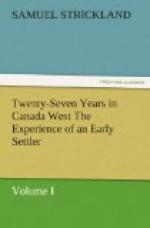The Americans have a plan of capturing these birds, by means of a decoy, or stool-pigeon, and nets. Thousands are often taken in this way during seed-time in the spring. When I first resided in the township of Douro, the pigeons used to be very plentiful at that time, their chief breeding-place being in the township of Fenelon, in a direct line west from my residence, some forty or fifty miles. And yet, soon after day-light, they would be passing eastward over my clearing, so vast is their swiftness and strength on the wing.
It is a curious fact that, although thousands passed daily for many days in succession, yet not one of them returned by the same route they went. I have been informed that this breeding-place has been deserted for several years, owing to the settlements having approached too near to please the winged possessors.
This satisfactorily accounts for the decrease I have noticed amongst these feathered denizens of the forest, during the last seven or eight years. In consequence of their having been disturbed, they have sought a more remote breeding-place. I am not at all certain whether this decrease is general through the province; but I feel quite convinced that, as civilization increases, all kinds of birds and wild animals will become less numerous, with the exception of crows and mice, which are greatly on the increase. Rats also have been imported, and appear to thrive well in the towns; though, I am happy to say, they have not found their way into my township yet—and long may they be ignorant of my location.
There is also another animal, which I think is more numerous than formerly—I mean the black squirrel. These pretty little creatures are very destructive amongst the Indian-corn crops. I have seen them carrying off a whole cob of corn at once, which I will be bound to say was quite as heavy as themselves.
The form of this animal is very elegant; the colour jet black—with a large bushy tail: the fur, however, is too open to be of any value. The flesh is excellent eating, far superior to that of the rabbit. In a good nut-season, in the western part of the province, the quantity of these animals is almost incredible.
I have heard old hunters say that, if the squirrels are numerous in the summer, the bears will be plenty in the fall, and also that their numbers give a sure indication of a severe winter. This saying, I believe to be true; because neither the squirrels nor bears are plentiful, unless there is an abundant supply of beech-mast, butter-nuts, hickory-nuts, &c., which Providence has kindly provided in more superabundant quantity on the approach of a longer and severer winter than usual.
Besides the Niger, or black squirrel, there are three other species in Canada West; first, the Cinereus, or grey squirrel, which is larger than the black squirrel. Its fur is something better, but the animal is not near so numerous. Secondly, the Ruber, or red squirrel, smaller than the last, but equally destructive.




